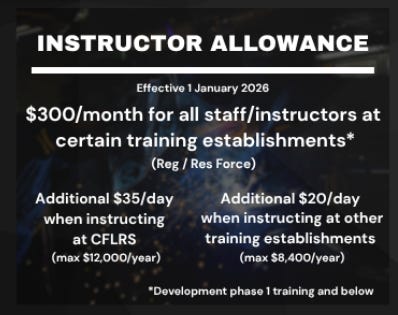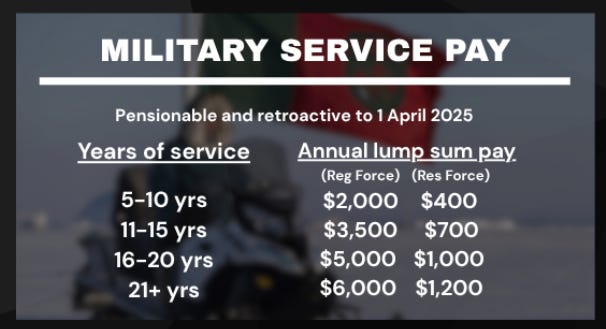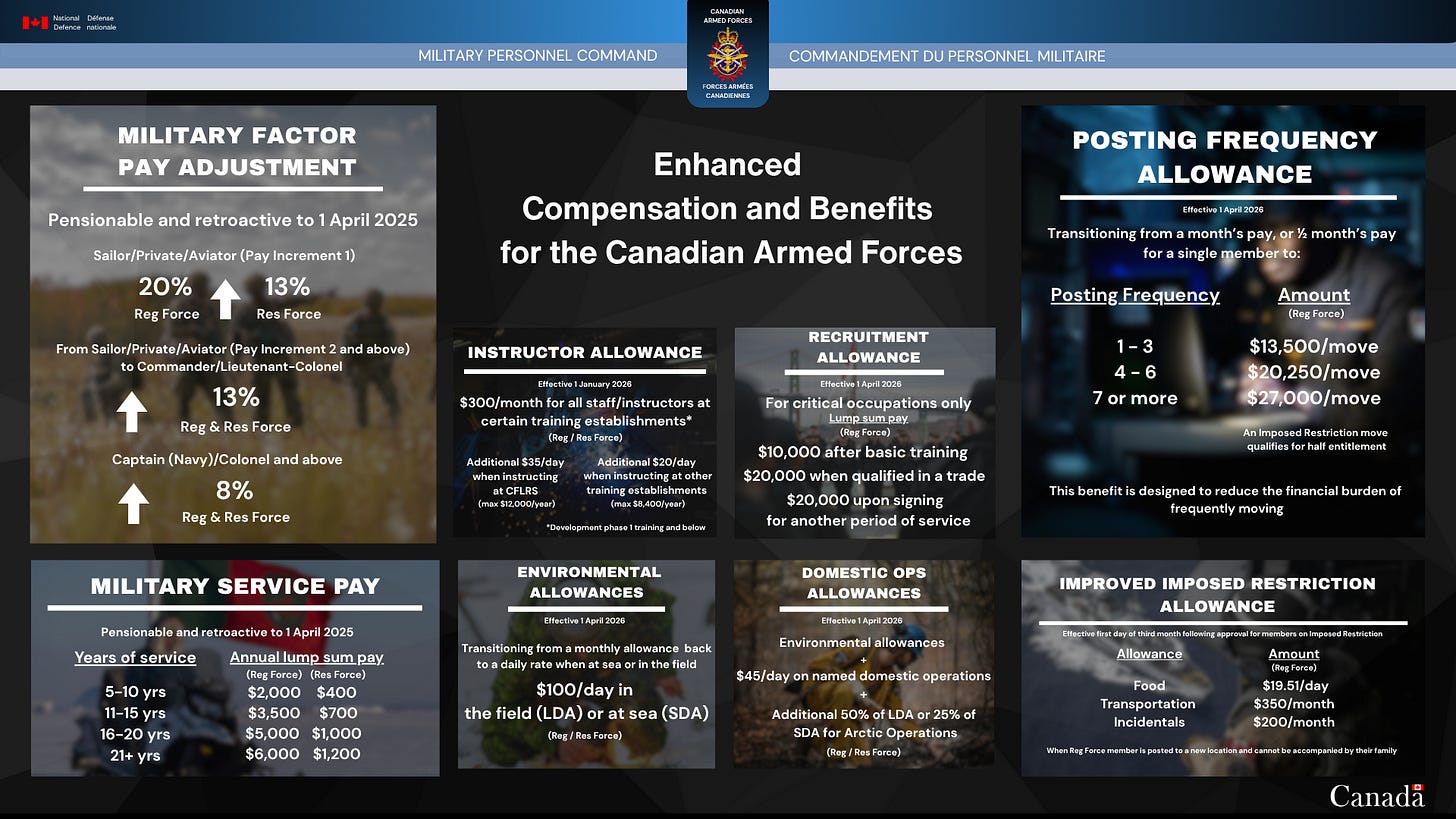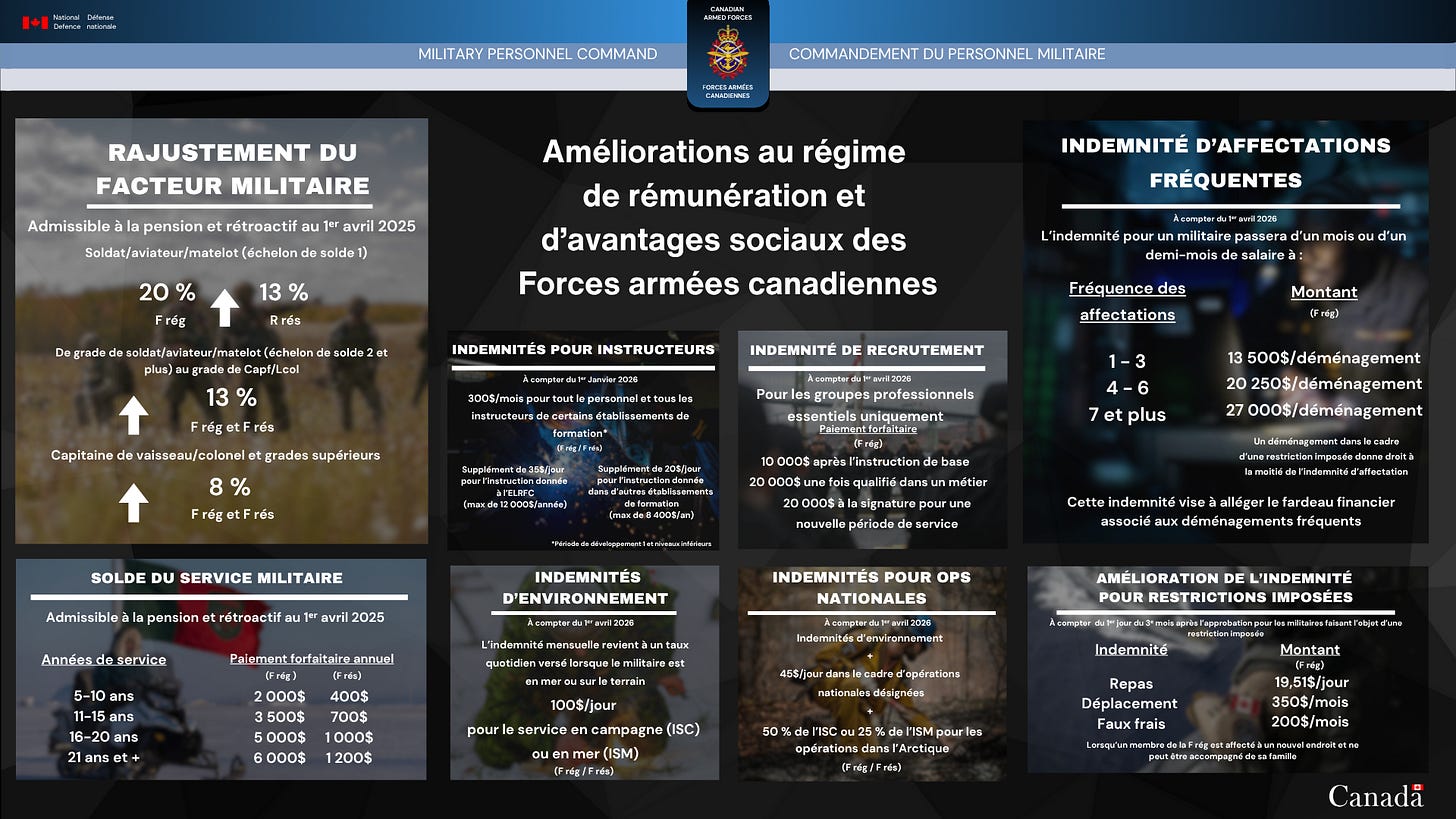How the New Pay Raises Impacts the CAF Cyber Forces
Big announcement on CAF personnel support and pay raises, but what's the cyber component?
Canadian Cyber in Context is sponsored by
All views expressed belong to Canadian Cyber in Context and do not reflect the position of any sponsor.
Big news today as Prime Minister Mark Carney and the Department of National Defence and the Canadian Armed Forces announce more information on how they intend to invest approximately $2 billion in support for CAF personnel. An infographic and backgrounder can be found at the bottom with specifics, but I will be talking about how all of this will affect the CAF Cyber Forces and CAFCYBERCOM.
Overall, the CAF Cyber Forces and CAFCYBERCOM will receive a pay boost, with the majority of regular force members receiving 13% (for Lieutenant-Colonels and below) or 8% raise (For Colonels and above). There are several benefits that the Cyber Forces will gain, but it is unlikely that cyber operators will receive a bonus for enlistment. Why? According to CAFCYBERCOM Commander Dave Yarker and others I have heard from, they are pretty happy with their current cyber operators, a change from a few years ago when they struggled to find people.
Training
One likely reason for this is that the CAF Cyber Forces have been investing considerable time and effort in developing its cyber operator training program, which is producing CAF cyber operators. Although there are ways to improve training, they seem satisfied with their current staff and now aim to retain them while enhancing the conditions and morale of existing staff to encourage them to stay. Presently, 72 weeks of training for cyber operators is done by private institutions, with an additional 16 weeks at the Canadian Forces School of Communications and Electronics (CFSCE) in Kingston. Instructors. The bulk of bonuses for instructors are for Development Phase 1, which can be understood as basic military qualification and training, and Canadian Forces Leadership and Recruit School, so this won’t affect the Cyber Forces too directly. However, the additional $20/day when instructing at any other training establishment would directly help instructors at the CFSCE. CAFCYBERCOM is starting the groundwork to develop its own training academy for cyber operators, which is likely to benefit from these allowances.
Environmental & Domestic Operations Allowance
The announcement of special environmental and domestic operations allowances was well received. These allowances are likely to increasingly help and support the CAF Cyber Forces as they are increasingly deployed for operations. CAF personnell will now receive special allowance when deployed in the field or at sea and when deployed on domestic operations. This can mean getting both environmental and domestic operations allowance, which increases when deployed to the Arctic as well.
These are likely to be of significant benefit to the CAF Cyber Forces as they will increasingly be deployed domestically and internationally, including in the Arctic. There is often an assumption that Cyber Forces can stay in Ottawa and conduct operations around the world from there. This is only true for some things, but there is still a significant amount of work for Cyber Forces closer to the frontline. A key reason for this is to ensure reliable connectivity, as well as the need to be on-site to work directly with the computers that may not be able to be accessed remotely due to security concerns. Cyber operators will increasingly be deployed abroad on the NATO mission in Latvia and potentially in the Indo-Pacific, so some of these new allowances can help with this more.
Military Service Pay
In addition to a general pay increase, there is an increase based on years of service. While this will affect CAFCYBERCOM and the Cyber Forces, I am hesitant to think it will have a significant impact. These lump sums, based on the number of years of service, are welcome, but I do not believe they are significant enough to outweigh the advantages of leaving the forces after the same amount of time/years of service.
As an example, a common problem for military cyber forces (not just Canada) is that once a military cyber operator is fully trained, they instantly become valuable to the private sector, which is often able to pay them more. This often leads to situations where, as soon as the cyber operator’s contract is up, they leave the military. Although this could have historically been the case, the impression I have gotten is that the CAF is now getting a steady stream of Cyber Operators. The caveat to this is the more advanced capabilities, which include cyber operators with time and experience to lead, as well as those who understand offensive operations and possess more advanced cyber capabilities. Last I heard, there was still a strong desire and need for such folk, but it is unclear to me how deep or serious a need this presents. The impression I have gotten is that they would like to have more, but are not necessarily happy or at full capacity with those that can conduct offensive operations.
Although the private labour market for cyber professionals is much more competitive than it used to be, there is still a significant demand for military-trained cyber operators due to their experience, but also because of their military classification and knowledge of the military. It is because of these conditions that CAFCYBERCOM and most military cyber forces rely on other aspects to attract talent beyond just financial incentives. While they indeed focus on financial needs, compensation for trained cyber operators is quite high. However, morale and the feeling that you are making a difference, combined with the opportunity to do cool things, can make a much bigger difference for many than financial considerations alone.
Edit: CAF recruitment websites are still listing bonuses for cyber operators, so the lack of mention is likely do to a focus on new bonuses and arrangements.








